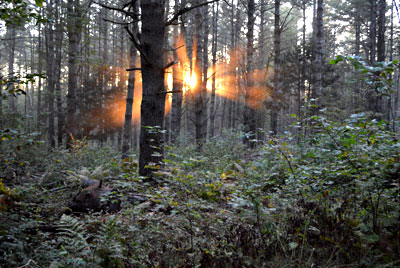 |
| Connect with MOFGA’s Low Impact Forestry Project to learn about carbon sequestration in our woodlands. English photo |
By Mitch Lansky and Peter Hagerty
Years ago the Low Impact Forestry (LIF) Project surveyed MOFGA members who owned forestland. We asked for feedback from landowners, whether they owned 1 acre or 500. The survey was not scientific, but it did reveal that the acreage of those members’ forests greatly exceeded the acreage of their fields or gardens.
Today, 20 years later, carbon emissions are clearly destabilizing global climate, and these problems will become more severe if annual emissions to the atmosphere are not reduced dramatically. While the main strategy for reducing carbon emissions is to use less fossil fuel, cost-effective opportunities also exist to increase carbon capture and storage through changes in management of Maine’s forest land.
Northern New England is one of the most densely forested regions in the United States. Even modest gains from increasing wood volumes in the forest could significantly impact capturing and storing carbon – carbon that would otherwise enter the atmosphere.
MOFGA members can increase carbon sequestration by preventing deforestation; reserving more acres of unmanaged forest that are in, or have the potential to transition to, higher-volume stands; and changing forest practices to increase the amount of carbon stored in managed stands over time.
The LIF Project has been meeting with members of the New England forestry community over the past year in hopes of revising the present LIF curriculum to include the latest procedures that would increase carbon sequestration. We know that the climate issues we face are global and that forestry alone cannot solve the problem of climate change; but we want to explore what we can do locally, and forestry is one place where we can make a difference.
These opportunities should be welcomed by owners of both large woodlands and small “family forests.” We have the power to help increase the amount of carbon captured and stored across our forested landscapes in trees, living and dead, and in the soil that holds the trees.
The LIF Project would like to invite you to a conference this summer (date TBA) where these and other issues would be addressed in the spirit of what is best for our forest environment and the role the forest plays in fighting climate change. Please contact us for more information: Mitch Lansky, [email protected]; Peter Hagerty, [email protected].
